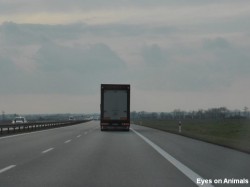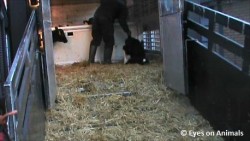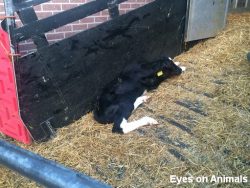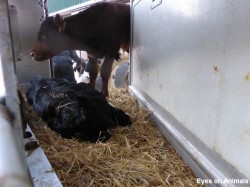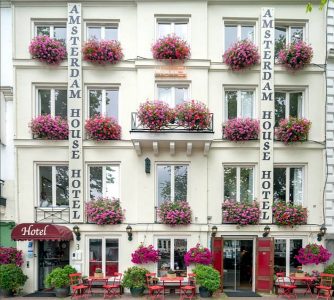On March 27th we visited the export and control post “Dam-Pol” in Poland, owned by a Dutch animal trader. At that moment very young calves – 2 to 5 weeks of age – were present. They were given the 24 hrs rest as stipulated by the EU Transport regulation. Final destination was a veal farm in the Netherlands. Transport was carried out by Kroes & Jansma. We decided to follow the transport to the Netherlands and check on the wellbeing of the calves during transport until their final destination.
During the transportation and unloading we observed a number of severe animal-welfare problems and violations:
- The calves did not have access to water because the truck only had water nipples. It is known that calves at this very young age do not know how to drink from these nipples. More over calves of just 2 to 5 weeks of age need milk and not water.
- Two calves were severely weakened and lying on the floor being trampled by the other calves. Through the side access-door the truck driver managed to enter and get the calves back on their feet again.
- Transport time from the export station in western Poland to the veal farm in Friesland took 14 hrs. During this transport only one driver was present. This means the driver exceeded his maximum allowed driving time. A driver driving too long will get tired, is less patient with checking and unloading animals and also risks the safety of other users of the highway as tired drivers are more prone to cause accidents.
- When unloading the animals at the veal factory-farm, two calves were not able to stand up. They were dragged from the truck by the driver and the farmer. Other calves collapsed at the entrance of the factory-farm. Calves were hoisted-up by their tails.
- Calves were put in individual boxes with slatted concrete flooring and barely any room to move back and forth or turn around. One of the boxes had a large hole in the flooring. In another box a calf that had arrived 2 days earlier from Lithuania was so weak he did not respond to us at all. He lay side wards more dead than alive. Eyes on Animals asked the farmer to at least provide the weakened calves with some bedding. However, according to the worker, no bedding was present at the farm. Therefore Eyes on Animals took bedding from the truck and put it in the boxes.
This transport was followed in cooperation with the Dierenbescherming (Animal Protection organisation in NL). The images were broadcasted by Dutch television EenVandaag and helped to ban the export of unweaned calves and extra monitoring during the import of calves.
